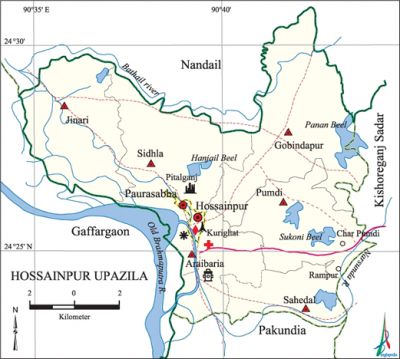Hossainpur Upazila
Hossainpur Upazila (kishoreganj district) area 121.29 sq km, located in between 24°23' and 24°31' north latitudes and in between 90°34' and 90°44' east longitudes. It is bounded by nandail upazila on the north, pakundia and gaffargaon upazilas on the south, kishoreganj sadar upazila on the east, Gaffargaon upazila on the west.
Population Total 183884; male 90229, female 93655; Muslim 180234, Hindu 3525, Christian 37 and others 88.
Water bodies Main rivers: old brahmaputra and Narsunda; Panan, Hanjail and Sukoni beels are notable.
Administration Hossainpur Thana was formed in 1922 and it was turned into an upazila in 1983.
| Upazila | ||||||||
| Municipality | Union | Mouza | Village | Population | Density (per sq km) | Literacy rate (%) | ||
| Urban | Rural | Urban | Rural | |||||
| 1 | 6 | 71 | 90 | 23118 | 160766 | 1516 | 49.3 | 40.7 |
| Municipality | ||||||||
| Area (sq km) |
Ward | Mahalla | Population | Density (per sq km) |
Literacy rate (%) | |||
| 5.58 | 9 | 16 | 23118 | 4143 | 49.3 | |||
| Union | ||||
| Name of union and GO code | Area (acre) | Population | Literacy rate (%) | |
| Male | Female | |||
| Araibaria 13 | 2471 | 5025 | 5293 | 44.5 |
| Gobindapur 27 | 5919 | 19607 | 20541 | 38.1 |
| Jinari 40 | 5777 | 13185 | 13306 | 42.3 |
| Pumdi 54 | 4759 | 13479 | 14277 | 42.0 |
| Sahedal 67 | 3040 | 10322 | 11027 | 46.7 |
| Sidhla 81 | 6477 | 17197 | 17507 | 36.7 |
Source Bangladesh Population Census 2011, Bangladesh Bureau of Statistics.

Archaeological heritage and relics Pitalganj Neel Kuthi (1800), temple at the Palace of Gangatia zamindar (1800), Kulishwaribari Kali Mandir (seventeenth century).
War of Liberation During the war of liberation the freedom fighters killed 39 members of the Pakistan army and captured huge amount of arms and ammunitions. On 18 November the freedom fighters destroyed a bridge by explosive. They carried out operation at Charpumdi Bazar and also attacked the razakar camp at the Hossainpur CO office and captured 14 razakars along with their arms. There is a mass killing site at Kurighat in front of Hossainpur police station and a memorial (Shahid Manju Gate) was built in the upazila.
For details: see হোসেনপুর উপজেলা, বাংলাদেশ মুক্তিযুদ্ধ জ্ঞানকোষ (Encyclopedia of Bangladesh War of Liberation), বাংলাদেশ এশিয়াটিক সোসাইটি, ঢাকা ২০২০, খণ্ড ১০।
Religious institutions Mosque 209, tomb 10, temple 2, Akhra 2.
Literacy rate and educational institutions Average literacy 41.8%; male 41.9%, female 41.8%. Educational institutions: college 4, secondary school 21, madrasa 13. Noted educational institutions: Gobindapur High School (1918), Hossainpur Pilot High School (1920), Hossainpur High School (1936), Piplakandi High School (1941), Madhakhola Fazil (Hons) Madrasa (1929).
Main sources of income Agriculture 65.81%, non-agricultural labourer 3.67%, industry 0.25%, commerce 11.98%, transport and communication 2.89%, service 4.81%, construction 0.93%, religious service 0.17%, rent and remittance 1% and others 8.49%.
Ownership of agricultural land Landowner 60.87%, landless 39.13%; agricultural landowner: urban 43.74% and rural 62.63%.
Main crops Paddy, jute, wheat, potato, mustard, sugarcane, betel leaf, maize, vegetables.
Extinct or nearly extinct crops Local varieties of paddy, kalai.
Main fruits Mango, blackberry, litchi, jackfruit, banana, papaya, custard apple, coconut, palm, star apple, indian apple.
Fisheries, dairies and poultries Fishery 1, dairy 10, poultry 14, hatchery 20.
Communication facilities Pucca road 59.23 km, mud road 307.01 km.
Extinct or nearly extinct traditional transport Palanquin, horse carriage, bullock cart.
Noted manufactories Flour mill, rice mill, saw mill, ice factory, biscuit factory.
Cottage industries Goldsmith, potteries, blacksmith, bamboo and wood work, tailoring.
Hats, bazars and fairs Hats and bazars are 17, fairs 5, most noted of which are Hossainpur Bazar, Hajipur Kachari Bazar, Pitalganj Bazar, Rampur Bazar, Harenja and Char Pumdi Bazar.
Main exports Paddy, jute, wheat, potato, sugarcane molasses, banana.
Access to electricity All the unions of the upazila are under rural electrification net-work. However 37.4% of the dwelling households have access to electricity.
Sources of drinking water Tube-well 92.1%, tap 1.0% and others 6.9%. The presence of arsenic has been detected 4.99% in shallow tube-well water of the upazila.
Sanitation 30.3% of dwelling households of the upazila use sanitary latrines and 48.6% of dwelling households use non-sanitary latrines; 21.1% of households do not have latrine facilities.
Health centres Upazila health complex 1, family planning centre 5, satellite clinic 6.
NGO activities Operationally important NGOs are brac, proshika. [Azizur Rahman Bhuiyan Babul]
References Bangladesh Population Census 2001 and 2011, Bangladesh Bureau of Statistics; Cultural survey report of Hossainpur Upazila 2007.
